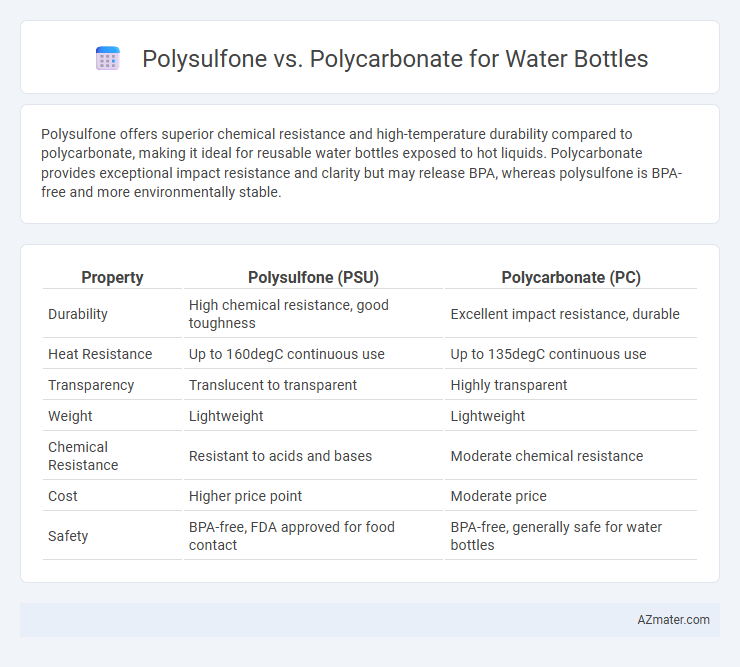Polysulfone offers superior chemical resistance and high-temperature durability compared to polycarbonate, making it ideal for reusable water bottles exposed to hot liquids. Polycarbonate provides exceptional impact resistance and clarity but may release BPA, whereas polysulfone is BPA-free and more environmentally stable.
Table of Comparison
| Property | Polysulfone (PSU) | Polycarbonate (PC) |
|---|---|---|
| Durability | High chemical resistance, good toughness | Excellent impact resistance, durable |
| Heat Resistance | Up to 160degC continuous use | Up to 135degC continuous use |
| Transparency | Translucent to transparent | Highly transparent |
| Weight | Lightweight | Lightweight |
| Chemical Resistance | Resistant to acids and bases | Moderate chemical resistance |
| Cost | Higher price point | Moderate price |
| Safety | BPA-free, FDA approved for food contact | BPA-free, generally safe for water bottles |
Introduction to Polysulfone and Polycarbonate
Polysulfone and polycarbonate are advanced thermoplastic polymers widely used in water bottles due to their durability and clarity. Polysulfone offers excellent thermal stability, chemical resistance, and high mechanical strength, making it suitable for hot and repeated sterilization applications. Polycarbonate provides exceptional impact resistance, optical transparency, and lightweight properties, often favored for everyday reusable water bottles requiring toughness and clarity.
Chemical Structure and Properties Comparison
Polysulfone features an aromatic backbone with sulfone (-SO2-) linkages, providing exceptional thermal stability and chemical resistance ideal for water bottles exposed to high temperatures. Polycarbonate consists of carbonate groups (-O-(C=O)-O-) within a bisphenol A-derived structure, yielding high impact resistance and transparency but lower chemical resistance compared to polysulfone. The sulfone groups in polysulfone enhance resistance to acidic and alkaline environments, whereas polycarbonate is prone to hydrolytic degradation and can leach bisphenol A under harsh conditions.
Durability and Impact Resistance
Polysulfone water bottles exhibit superior durability due to their high thermal and chemical resistance, maintaining structural integrity under extreme conditions. Polycarbonate bottles offer exceptional impact resistance, making them less prone to cracking or breaking from drops, but they may yellow or degrade over time when exposed to UV light. Choosing polysulfone ensures long-term stability in tough environments, while polycarbonate provides a lightweight, shatter-resistant option optimal for everyday use.
Heat Resistance and Temperature Tolerance
Polysulfone offers superior heat resistance with a continuous use temperature up to 170degC (338degF), making it highly suitable for hot water bottles and sterilization processes. Polycarbonate withstands temperatures up to approximately 135degC (275degF), but tends to degrade with prolonged exposure to high heat and can release bisphenol A (BPA) under certain conditions. For applications demanding high temperature tolerance and chemical resistance, polysulfone is the preferred material over polycarbonate in water bottle manufacturing.
Safety: BPA and Chemical Leaching Concerns
Polysulfone water bottles are free from BPA and exhibit superior resistance to chemical leaching compared to polycarbonate, which often contains BPA unless explicitly labeled as BPA-free. Studies indicate that polycarbonate bottles can release bisphenol A, a known endocrine disruptor, especially when exposed to heat or acidic substances. Opting for polysulfone ensures safer drinking water with minimal risk of harmful chemical exposure due to its inherently stable polymer structure.
Clarity and Aesthetics
Polysulfone offers excellent clarity with a high heat resistance, maintaining transparency without yellowing over time, making it ideal for water bottles where long-term visual appeal is important. Polycarbonate provides superior optical clarity and impact resistance, delivering a crystal-clear, shatterproof aesthetic favored in premium water bottles. Both materials ensure a sleek and attractive appearance, but Polycarbonate often achieves higher gloss and brilliance, enhancing the overall visual quality.
Weight and Portability
Polysulfone water bottles are significantly lighter than polycarbonate ones due to their lower density, making them highly portable for everyday use and outdoor activities. Polycarbonate bottles, while heavier, offer superior impact resistance but may add unnecessary weight for users prioritizing ease of carrying. Choosing polysulfone enhances convenience in travel and hiking scenarios where minimizing load is critical.
Cost and Availability
Polysulfone water bottles generally cost more than polycarbonate options due to their higher heat resistance and chemical durability, making them suitable for tougher environments. Polycarbonate is more widely available and commonly used in consumer water bottles, benefiting from large-scale production that lowers price points. Cost efficiency and accessibility make polycarbonate a preferred choice for everyday use, while polysulfone suits specialized needs despite its higher price.
Environmental Impact and Recyclability
Polysulfone water bottles exhibit superior chemical resistance and durability, contributing to a longer lifespan and reduced environmental waste compared to polycarbonate alternatives, which are prone to BPA leaching and shorter usability. Polysulfone is less commonly recycled but offers greater stability under harsh environmental conditions, whereas polycarbonate is more widely recycled due to established PET recycling facilities but poses potential hazards due to its chemical breakdown products. Choosing polysulfone enhances eco-friendliness through extended product life, while polycarbonate recycling depends heavily on regional infrastructure and careful handling to mitigate environmental harm.
Which Material Is Best for Water Bottles?
Polysulfone offers superior chemical resistance and durability, making it ideal for water bottles that require long-term use and exposure to harsh cleaning agents. Polycarbonate provides excellent impact resistance and clarity, but concerns over BPA leaching have led to reduced popularity for potable water containers. For safety, durability, and health considerations, polysulfone is generally the better material choice for water bottles.

Infographic: Polysulfone vs Polycarbonate for Water bottle
 azmater.com
azmater.com